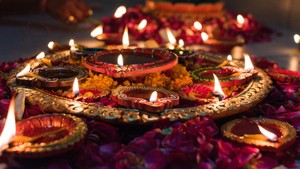
Diwali
Festival of lights celebrated by Hindus, Jains and Sikhs.
About the event
Diwali is a five-day festival celebrated by Hindu’s, Jains and Sikhs worldwide. Primarily associated with Hinduism, Diwali is one of the most widely celebrated Hindu festivals. The name Diwali comes from the Sanskrit "Dipavali", which translates as "row of lamps".
During Diwali lamps are lit, fireworks are set off and buildings are festooned in fancy lights. These lights signify the triumph of good over evil, of light over darkness and of knowledge over ignorance. They symbolically light the way for Lakshmi, goddess of wealth and prosperity and mark the day of return of Rama to his wife Sita after he defeated the demon Ravana.
Diwali is also seen as the start of the new business year, and as a celebration of the harvest. Other traditions include:
- Cleaning or redecorating the home and buying new clothes.
- Sharing gifts with others, especially sweets.
- Creating rangoli patterns in front of the house to welcome Lakshmi.
How to approach it
Any religious event is a chance for your students to explore a new culture or, if there are Hindu, Jain or Sikh students present, to share in the celebrations of a classmate. If you have any students that are confident enough you could encourage them to talk about their experiences of the festival. Either way, use this to stimulate your students' curiosity for other cultures. For example, you could explore the different ways that Diwali is celebrated all over the world. Ask: How do Hindus, Sikhs and Jains celebrate differently? How do different countries, regions and cultures celebrate differently? Alternatively, you could explore the exciting story of Rama, Sita and the demon Ravana with your class.
Conversation starter
Diwali is a festival celebrated by three different religions and communities all over the world. Why do you think so many different people share this celebration? See if you can find two different communities that celebrate this festival differently. What is the same? What is different?
